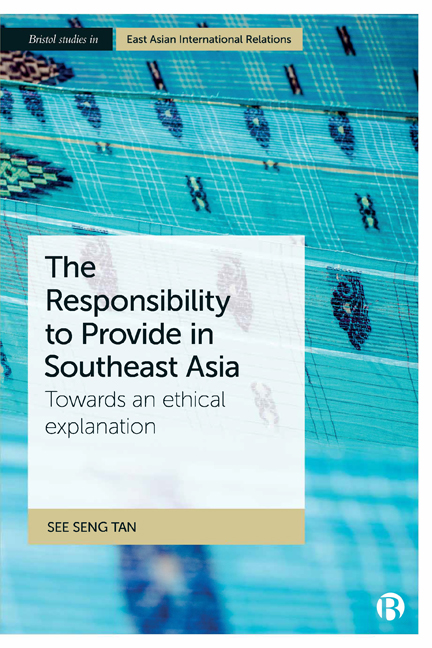Book contents
- Frontmatter
- Dedication
- Contents
- List of Tables
- List of Abbreviations
- Acknowledgements
- 1 Towards an Ethos of Responsibility in Southeast Asia
- 2 The Responsibility to Protect (R2P) and Responses from Southeast Asia
- 3 Towards a ‘Responsibility to Provide’ (R2Provide) in Southeast Asia
- 4 Institutionalizing Security Regionalism: Responsibility as ‘Response Ability’
- 5 Responsible Provision in HADR, Conflict Management and Human Rights
- 6 Towards the Responsible Management of Disputes in Southeast Asia
- 7 Communitarianism, Liberalism and the Limits of Responsibility in Southeast Asia
- 8 Levinas and the Responsibility to Provide in Southeast Asia
- 9 The Responsibility to Provide: Implications for the Region and Beyond
- Notes
- Bibliography
- Index
3 - Towards a ‘Responsibility to Provide’ (R2Provide) in Southeast Asia
Published online by Cambridge University Press: 02 March 2021
- Frontmatter
- Dedication
- Contents
- List of Tables
- List of Abbreviations
- Acknowledgements
- 1 Towards an Ethos of Responsibility in Southeast Asia
- 2 The Responsibility to Protect (R2P) and Responses from Southeast Asia
- 3 Towards a ‘Responsibility to Provide’ (R2Provide) in Southeast Asia
- 4 Institutionalizing Security Regionalism: Responsibility as ‘Response Ability’
- 5 Responsible Provision in HADR, Conflict Management and Human Rights
- 6 Towards the Responsible Management of Disputes in Southeast Asia
- 7 Communitarianism, Liberalism and the Limits of Responsibility in Southeast Asia
- 8 Levinas and the Responsibility to Provide in Southeast Asia
- 9 The Responsibility to Provide: Implications for the Region and Beyond
- Notes
- Bibliography
- Index
Summary
Introduction
With few exceptions, one of the unfortunate consequences of scholarship on the R2P and Southeast Asia is its conclusion, tacit or otherwise, that the region's weak acceptance of the R2P norm effectively denotes the relative absence of a responsible form of sovereignty there. Nonetheless, it has taken a while for the region to talk openly about what responsibility in its neck of the woods looks like or could conceivably look like, not least because security matters have long remained (and in some ways, still remain) the near exclusive preserve of policymakers and the academics and policy intellectuals who study and pontificate about it (Acharya, 2003a). As we shall see later, among the many regional developments in Southeast Asia, the region-wide debate among academics and policy practitioners that arose in the immediate aftermath of Cyclone Nargis, which devastated huge swathes of Myanmar in May 2008, was among the most useful in helping Southeast Asian leaders clarify what responsible sovereignty in their regional context could conceivably look like. Accordingly, Southeast Asian governments ought to exercise their sovereign obligation to provide for the security and well-being of their respective populations. However, in the relative absence of any such ability, governments ought to do their utmost to ensure that other resources are brought to bear in realizing those same objectives. What this book calls the ‘responsibility to provide’ – or the ‘R2Provide’ – can be defined, in the words of a former defence minister from Southeast Asia, as ‘a responsibility of all national governments to provide for the welfare of the people. If they are not able to provide for it, then it is their responsibility to see what other resources they can garner to help provide for the people’ (Teo, 2008).
However, as will be argued later, such a narrow and ultimately selfserving definition is insufficient, not least because it does not fully accord with the actions and activities of Southeast Asian countries themselves in their efforts as responsible providers. Granted, there is no question that when measured against the more exacting standards set by R2P, whatever sense of national and regional responsibility inherent and emergent within Southeast Asia falls short of the former.
Information
- Type
- Chapter
- Information
- The Responsibility to Provide in Southeast AsiaTowards an Ethical Explanation, pp. 43 - 56Publisher: Bristol University PressPrint publication year: 2019
